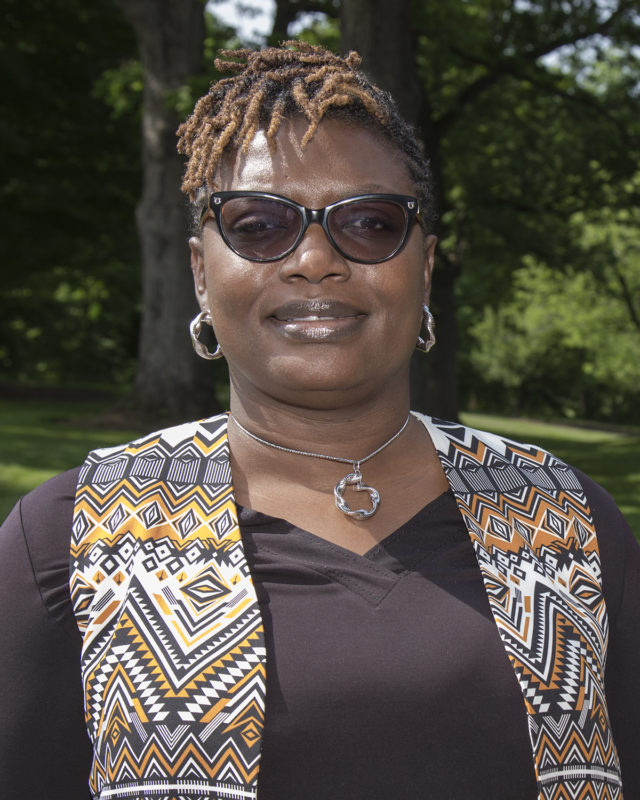Entrepreneurial farmer Patience Koku is emerging as an international spokeswoman for introducing innovation to Nigerian agriculture.
Koku, who founded and manages Replenish Farms, has been selected to participate in the Global Farmer Roundtable program. She will represent Nigerian agriculture at the prestigious World Food Prize and Borlaug International Dialogue Oct. 15-19 in Des Moines, Iowa, USA. The theme for the event is “Rising to the Challenge,” which Koku has done in shifting her career from fashion merchandiser to food producer.
At the World Food Prize, Koku will be joining an Oct. 17 panel discussion focused on “Innovation in Agriculture.” She is an outspoken advocate for ensuring that farmers everywhere have access to innovation, including modern seeds, irrigation, equipment and machinery. Koku walks her talk at Replenish Farms, a large, irrigated operation that produces soya, maize, rice and vegetables, as well as seeds.
“Going into farming, I found that people did things a certain kind of way for years,” she told the Alliance. “Even if it didn’t work, they kept at it. They were not willing to change. They weren’t willing to embrace new things. What I did different was I tried out new things. We set up our farm in a way that we had R&D [research and development] on different sections. We would try out different things. Three years ago, we had fields that had probably six different varieties of corn in the same season. So, we kind of learned what works and what doesn’t.”

Koku tries to model agricultural practices that other farmers can adopt. “One of the things that makes people want to try new things is if it works,” she noted. “With a lot of things that we tried that worked, the following year we had farmers come out to ask us, ‘what did you do?’ or ‘what seed did you use?’ I think the mindset that most farmers have is if they see something that works they would definitely be willing to try it out.”
Koku recently attended the Cornell Alliance for Science global farmers leadership course in Illinois, where she was interviewed on TV about African agriculture and joined five farmers from Kenya, India, the United Kingdom and the United States in a livestreamed panel discussion about the difficulties that farmers face everywhere.
“We have had a lot of challenges with mechanization,” Koku said. “Nigeria is not very mechanized. A lot of people are still farming in the traditional ways, without using a lot of modern equipment. We found that when you have to farm or crop large fields, it’s very challenging if you don’t have planters, boom sprays and so on. And then we have a lot of challenges with seeds that don’t have the ability to give you high yields, so no matter what you put in there, you only get a certain level of yield.”
Now that Nigeria has adopted biosafety regulations and approved its first genetically modified (GM) crop, pest-resistant Bt cotton, Koku is hopeful that farmers will be able to obtain other varieties of improved seeds.
“GM crops would make a whole world of difference for Nigerian farmers,” she said. “It would be the dawn of a new day. We would get crops that we could plant and get excellent yields and get a bumper harvest.”
Koku said that herbicide tolerance and pest resistance are two traits that would be highly valued by African farmers.
“If we could control weeds a lot better, it would translate to better yields at the end of the day,” she said. “And we have challenges with insects and pests. It would be good to have a Bt or GM crop seed resistant to the fall armyworm. In the past two years, we spent a lot of money on pesticides trying to control the fall armyworm. A Bt crop would also be good for the farmers’ health because in our country, [pesticide] safety regulations are not observed properly by the farmers. Most times, you find that the farmers are spraying in their field without protective clothing and that makes them get sick. A Bt crop would really help us go a long way toward solving that problem as well.”
At both her farm and in her outreach work, Koku is motivated primarily by “my hopes and dreams that we can feed ourselves. I think that that is a huge problem. It’s sad that you can have a nation of over 200 million people and not be able to feed ourselves. I think that GM crops would give us access to an economy where we have enough food, and then we can even possibly export the excess that we will be able to grow.”
